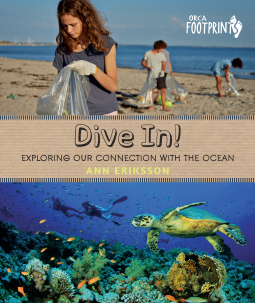Dive In: Exploring our Connection with the Ocean by Ann Eriksson is a nonfiction book for children and adults. It starts with the idea that we are all connected to the ocean, and the ocean to us. The ocean provides half the oxygen we breathe; it feeds us, creates our weather and provides us with water. But people have not been as kind to the ocean in return. The problems are many: pollution, overfishing, rising seas and acid waters. What can be done? Don't despair; take action.
Dive In explores the connection between mankind, our actions, and the oceans. We get a great deal from the ocean, and treat it like our private playground, drilling field, and dumping ground. Thankfully there are scientists and activists that spend their time studying the ocean and working to protect it, and everything that lives in, on, or near it. The book is text heavy, with some great information and photographs to engage readers. I liked that there were big and small things suggested for readers and their families to do in order to help the environment. The glossary and additional resources at the end of the book can help readers understand more, and hopefully encourage them to further explore the topic on their own. Some of the informational text boxes were hard to read because of the color choices, I was reading a pre publication galley, so that might have been fixed by the final printing. I think this is a great book for older children, or reading together as a family. Some of the text is more difficult than I think new or struggling readers might be happy tackling on their own. I do think that parts came off as a little too preachy, and just how big the changes could or should be might be overwhelming to readers, even though the little changes are mentioned as well. I know that I was a little taken aback and felt a little preached at rather than encouraged to make bigger changes.
Dive In is an information and interesting read. I was fascinated by some of the statistics and details about the ocean itself and think it can help readers see how interconnected the environment is, and how even the smallest choices can have an impact.


No comments:
Post a Comment